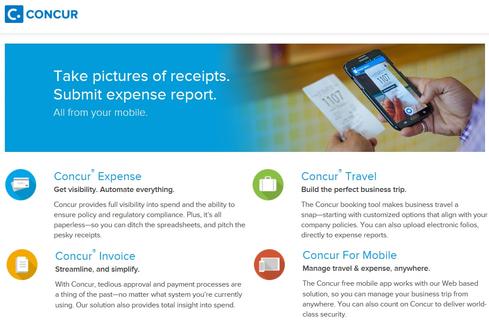SAP finalizes its purchase of cloud-based travel-and-expense management vendor Concur. Is it a coup or a misfit?


10 Windows Tablets, Laptops Under $200: Holiday Steals
10 Windows Tablets, Laptops Under $200: Holiday Steals (Click image for larger view and slideshow.)
SAP's $8.3 billion acquisition of Concur, the cloud-based travel-and-expense management company, is a done deal, the company announced late Thursday.
SAP paid quite a premium for Concur, shelling out more than 15 times last year's revenue and nearly 12 times the $700 million revenue Concur is expected to bring in this year. SAP said Concur will contribute 40 million to 45 million Euros ($49 million to $55 million) in cloud subscriptions and support revenue to its fourth-quarter and full-year 2014 results.
The deal adds Concur's more than 23,000 customers and 25 million users to the SAP cloud. Concur will operate as a business unit within SAP, the company said, with existing Concur management reporting into SAP CEO Bill McDermott.
The deal vaults SAP ahead of Oracle in cloud-revenue run rate, and makes it second only to Salesforce.com. Oracle's Safra Katz, recently promoted from co-president to co-CEO, publically criticized the Concur deal as non-strategic, saying "maybe tomorrow they'll buy Dairy Queen."
[Want more on SAP's Concur deal? Read SAP $8.3 Billion Concur Buy Caps Pricey Cloud Push. ]
Executives at SAP are working to counter that perception, describing Concur as a crucial addition to its 1.6-million-supplier-strong business network. The cornerstone of that network is the cloud-based Ariba commerce network, which SAP acquired for $4.3 billion in 2012. SAP reportedly paid another $1 billion in May (though terms were not disclosed) to buy Fieldglass, which offers cloud-based apps for contingent workforce management.
The idea is that businesses today are highly virtual, far more likely to outsource sub-manufacturing, parts of the supply chain such as warehousing and distribution, and even substantial parts of the workforce with temporary or contract labor. These connections must be visible, and Concur is the proverbial cherry on top of that business network sundae, SAP reasons.
Travel-and-entertainment spending typically represents at least 10% of the corporate budget, SAP CEO Bill McDermott recently told InformationWeek. "If you were to ask a CEO, 'Is 10% of the expense in your company important to you?' and they say, 'No,' I would be surprised," McDermott said.
SAP already had its own cloud-based travel-and-expense app, but SAP execs say Concur has built a consumer-grade experience and has been particularly adept at building direct relationships with travel, hotel, and entertainment suppliers as well as through global distribution systems such as Sabre. As a result, users are much more likely to find their preferred travel options and more likely to use Concur for all travel and entertainment spending. That means corporate customers get better visibility into spending.
The next step with Concur will be standardizing integrations with SAP financials and supplier-relationship-management applications and bolstering analytical capabilities so companies can drive better deals with airline, car rental, hotel, food, and entertainment suppliers.
"The dirty little secret is that few companies really know what they're spending with which suppliers," said Tim Minahan, CMO of SAP Cloud, in a phone interview with InformationWeek. "Our business network lets you manage the entire supplier relationship, from discovery and qualification through purchasing, fulfillment, and payments in all spend categories."
Travel managers, in particular, will be better able to "load balance" travel spending, Minahan said, because they'll have better knowledge of room nights at hotels, total miles and numbers of segments between airport destinations, and days of car rentals in particular cities. This information can be used to trigger bigger dicsounts.
SAP last year introduced analytics-driven Ariba Recommendations whereby it suggests alternative suppliers or best times to buy based on the experience of other buyers on the network for particular commodities or services.
"These are the types of insights that you can only get when you have networks transacting at scale," Minahan said.
Travel-and-expense management is no small part of corporate expense. My own company recently implemented a single instance of Oracle E-Business Suite and its travel-and-expense-management app so it could get a better, global handle on these expenses. That rollout involved months of planning and a week-long (planned) service outage. If SAP can promise more agile, cloud-based transitions in service, I'm sure plenty of customers will be interested.
Apply now for the 2015 InformationWeek Elite 100, which recognizes the most innovative users of technology to advance a company's business goals. Winners will be recognized at the InformationWeek Conference, April 27-28, 2015, at the Mandalay Bay in Las Vegas. Application period ends Jan. 16, 2015.
About the Author(s)
You May Also Like







